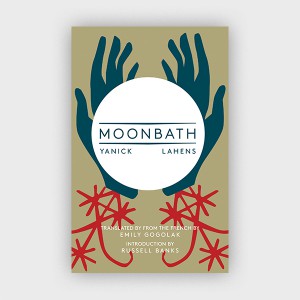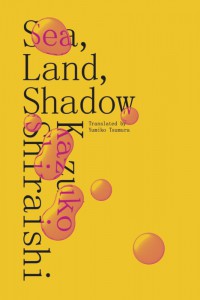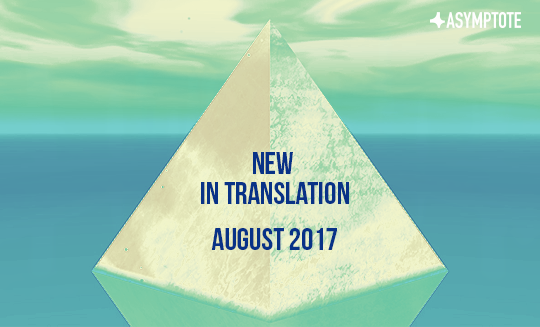With Asymptote you can be sure to have the latest reading recommendations. True to form, we bring you a selection of the exciting new books this month. Which one is going to claim a place in your bookshelf?
![]()
Kholin 66: Diaries and Poems by Igor Kholin, translated from the Russian by Ainsley Morse and Bela Shayevich, Ugly Duckling Presse.
Reviewed by Paul Worley, Editor-at-Large, Mexico
English language readers already enamored of poets such as the Roman Catullus or the more recent Charles Bukowski will find a similarly humorous, difficult, and enthralling companion in the pages of Russian Igor Kholin’s (1920-1999) recently translated Kholin 66: Diaries and Poems from Ugly Duckling Presse. An autodidact whose experiences in the military included a near-death experience in World War II, Kholin in many ways perhaps serves as a vital counterpoint to the American Bukowski insofar as both writers, despite the fact that they are writing throughout the Cold War between their respective countries, cast an unrelentingly critical gaze on the societies they inhabit, bearing witness to abuse, the dirty, and the neglected, and rendering these as poetry. The translators note that although Kholin’s “occasionally unrestrained misogyny” may rankle the sensibilities of many readers, they nonetheless felt compelled to leave his attitude in their translation as “it seems to constitute part and parcel of his self-positioning and character” (9). Along those lines and, in tandem with Bukowski, one also wonders about the extent to which the writer’s misogyny is not a gendered version of a broader misanthropy from which the poet does not even exclude himself. After all, the poetic Kholin muses on the possibility that thinking he is “a creep…It’s not such a leap” (80), as well as understanding he is one for whom wine is “made” and shit is “laid” (85). As he criticizes his social circle for their faults and flaws in his diary, a passage written in a friend’s handwriting takes on the subject of Kholin himself, claiming the poet is “intellectually limited” (46) and that his “advice on writing is naive” (48). Perhaps unsurprisingly, marginal notes in the poet’s own hand describe these as “the best thing Yodkovsky [the friend] has ever written” (49).
As the title suggests, the volume contains portions of Kholin’s diary from the year 1966, as well as poems from his Selected poems that, as the translators state in their preface, are “roughly contemporaneous with the diary” (9). This juxtaposition allows for an interesting read across the text that situates parties where “Yodkovsky got drunk before everyone else. It was all over by midnight. People read their dumb poems” (13) in the context of poems where, among other things
Men of art
You need broads
To intensify your sensations
Yes
Or else you’re cold
As toads. (77)
In the village to where he moves, Kholin observes that “For the most part people live in filth and poverty” (17), which in the poetry presumably becomes verses where
Downstairs around the corner store
The boys are getting blotto;
Meanwhile the neighbors down two doors
Are beating up their daughter (71).
In theme and content there is a kind of poetic anti-poetics at play here, elevating the ugly and uncomfortable to the realm of art, but not necessarily to that of the beautiful or the sublime. In turn, it’s fascinating to note that one of Kholin’s primary means of sustaining himself was authoring poetry for young children, and one is left wondering how this work does or does not intersect with his unflinching approach to “poetry for adults.”
Morse and Shayevich’s translations of both the poetry do an excellent job of conveying the formal elements of Kholin’s poetry in English, using rhythm and rhyme to great effect in underscoring the work’s caustic commentary on everyday life. Take, for example, the following poem:
Not allowed on the subway ¾ visibly plowed
Outside, the fog was a thickening cloud
He slumped on the sidewalk, as if in a trance
While he was passed out, they made of with his pants (72).
The internal pauses created by the em dash and commas mimic the drunken subject’s uneven movements and prevent the reader from falling into a sing-song pattern that would otherwise take shape across the perfect rhymes of the couplets plowed/cloud and trance/pants. Further, despite the dreamscape of a fog-encased subway station cultivated by the first three verses, the contrasting sonic and signifying qualities of the couplet trance/pants serves to undercut the long established poetic tradition of mystic transcendence exemplified by Saint John of the Cross, Saint Teresa of Ávila, William Blake, and Arthur Rimbaud. Whereas altered states (“trances”) may cut through the veil of the mundane to reveal another reality in the works of these other poets, here they merely serve as a pretext for the drunken voyager’s being robbed of even the clothes he wears. In terms of biting let-downs in the English language, this rendering of Kholin’s work is not less artful than the passage from Byron’s “Don Juan” when, commenting upon the recent loss of a ship and its crew, the narrator ironically states,
They grieved for those who perished with the cutter,
And also for the biscuit-casks and butter (621).
Their ability to wed form to content in such a way that each sheds further light on the other reflects no doubt the nuanced understanding that the translators have of Kholin and his work, and their translation is much enriched for it. Kholin notes in his dairy that a translation of the German poet Rilke done in part, if not entirely, by the Russian Nobel Laureate Boris Pasternak represents, “a brilliant poet in an appalling translation” (18). Morse and Shayevich have given us something quite the opposite: the brilliant translation of an appalling poet.

Moonbath by Yanick Lahens, translated from the French by Emily Gogolak, Deep Vellum Publishing.
Reviewed by Catherine Belshaw, Grant Writer
Throughout this story, it will be important to pay attention to the wind, the salt, the water and not just to men and women.
At its surface, Moonbath describes the history of two rural families, one rich, one poor, whose sons and daughters, fortunes and misfortunes are intertwined with each other at a time when political turmoil is engulfing Haiti in the twentieth century. But this does not do Yanik Lahens’ Femina Prize winning novel justice. More essentially Moonbath explores how the political and natural worlds, life and death, humans and “the Spirits, Mysteries, and Invisibles” interact: it is a Chasson-pointe, a Haitian Creole term meaning “a song that obliquely comments on an event that took place in a community.”
Told from the perspective of two narrators, Moonbath flows back and forth through Haiti’s history. For Cétoute, the granddaughter of the ill-fated union between Olèmene Dorival and Tertulien Mésidor, the story is an attempt to “piece the whole sequence of my existence” together by bringing her ancestors “back to life, one by one.” Another narrator tells the story of those ancestors with a villager’s eye view of life in Anse Bleue, the Dorival family compound. Through this voice we learn of François “Papa Doc” Duvalier’s consolidation of power, the terror of the Tonton Macoute, and the resistance movement that eventually led to his son and successor, Jean-Claude’s (“Baby Doc”) exile.
But in Moonbath, history is both animated and constrained by other, deeper forces. Here life, religion, politics, and nature toy with human beings; the struggles of the book’s characters reveal to the reader that there is a longer, more enduring drama at work. Lahens expertly weaves these forces together so that references to historical events or people are only hinted at, and in ways that feel true to how people far removed from stations of power might experience them. Duvalier, for example, is only known as the “the man in the black hat and thick glasses.” And as far away as Anse Bleue is from the political centre of Port-au-Prince, Lahens perfectly captures how historical events, or “the story between people more powerful than us,” intrudes on this place through family members caught up in these events―joining the militia as rural recruits, in the case of the Dorivals, or enriching themselves through collaboration with the regime, as in the case of the Mésidors.
Nowhere is this clearer than in Lahens’ depiction of the Dorival practice of voodoo and in her description of Olèmene and Tertulien’s troubled relationship. In one of the book’s most powerful scenes the Dorival family comes together in a ceremony. It is during this ceremony when Olèmeneis becomes possessed by her lwa (a voodoo divinity) that we understand her passion for Tertulien, and how dangerous this relationship will prove to be for their families. As their relationship progresses, so do the political and spiritual struggles that pervade their lives. As Tertulien becomes compromised by his involvement with the violent Duvalier regime, that violence manifests itself in his relationship with Olèmene. Indeed, we gain a much more meaningful understanding of that political violence and its long-term consequences for Haiti when we see how it impacts Olèmene.
It is her beautiful depictions of voodoo that also empowers her readers to see how people so set upon by the forces of oppression are also imbued with a resilience that ensures survival.
As though to remind us that between life and death everything passes fast. Very fast. Pleasures faster than misfortunes, but everything passes. And that we need to take everything, pleasure and dread, suffering and bliss…All of it.…Because life and death hold hands. Because death and pleasure are sisters. And Gédé…he laughs at God, at the Grand Maître. And we laugh with him.
When in all other, more material, aspects, one might have seen only this family’s misery, we instead see through their practice of voodoo the sense of community, solidarity, and resilience it bestows.
For readers here, of further interest will be translator Emily Gogolak’s sensitive translation. Many French and Creole words are italicized in this English translation, with the Creole defined in a glossary at the end of the book. The choice to leave many key words in Creole, including ones where a suitable French or English translation could have been found, serves a story as subtle and evocative as this one very well. Jardin or Guinée carry different meanings in Creole, and by leaving words that refer to aspects of the voodoo religion, the social structure of Haiti’s rural communities, and the environment in which they live untranslated lets the reader experience these words as another manifestation of the story’s central theme which explores the pervasiveness of those very elements in the lives of the story’s characters. A remarkable accomplishment.

Sea, Land, Shadow by Kazuko Shiraisi, translated from the Japanese by Yumiko Tsumura, New Directions
Reviewed by Sohini Basak, Social Media Manager
Sea, Land, Shadow may at first seem like a deceptively elemental title for Kazuko Shiraisi’s book of poems coming out this month from New Directions. Containing work composed between 1951 and 2015, and translated by Yumiko Tsumara, this collection presents to English-language readers the eclectic and electric voice that Shirai’s is. Opening the book, one notices how each of the poems sit on the page. The use of italics and non-conventional spacing between words makes an impression immediately. In her note for Asymptote, Tsumara explains how italicization and kerning are ways of marking Shiraisi’s innovative use of Japanese characters for English-language readers. The translator explains how Shiraisi will use katakana for a word usually written with hiragana to underline the visual sharpness of the word. Such material exploration of language is rare to see, especially in translation, and what I felt this volume lacked firstly was a note or an introduction from the translator or a Japanese literary scholar (along with a few of the original Japanese poems) on such nuances, the knowledge of which deeply enriches the reading experience of Shiraisi’s poetry.
Born in Vancouver in 1931, Kazuko Shiraisi moved to Japan just before the war. She started publishing her works in avant-garde magazines when she was seventeen, and her first collection came out by the time she was twenty years old. Since then she has been known for her surreal imagery, drawing strongly from modern jazz, and writing unapologetically about spiritual and sexual freedom in a rapidly disengaging society. American Beat poet Kenneth Rexroth (to whom she dedicates a poem in this collection) dubbed her the Allen Ginsberg of Japan. Shiraisi has performed in several jazz festivals (in fact, the audio recording she sent for Asymptote has her performing her poetry with trumpet accompaniment) alongside the likes of John Coltrane. Her involvement with the jazz movement is explicit in Sea, Land, Shadow too, with references to iconic jazz numbers and albums, the repetitions, footnotes on musicians, the Hudson River, and listening to “Sentimental Journey” one October.
Violating conventional syntax and upturning the lyricism we are prone to free associate with Japanese poetry, in reading Shiraisi’s words, we never arrive where we expect to. There’s no telling where the poems are going. For example, in the short poem ‘Ear’, a sleeping woman’s earlobe suddenly takes in the world, becomes the woods, and “rapidly/recovers the world inside”. We are left grasping at analogies that are unfamiliar yet somehow relatable. Alongside prominent strokes of the absurd, Shiraisi’s poems sometimes have an undercurrent of violence. And sometimes, the sea barks, the futon commands the owner to fall asleep, Lizard God inhabits the earth while “outside, / an era passes by with raised voices will, action and passion” (“Roman Condom”). In her homages to jazz musicians Dave Holland, Milcho Leviev, Mary Wells, Coltrane on one hand, and to Japanese writers Akito Arima, Niji Huyuno, Yukio Mishima, on the other, readers are given a glimpse of the cultures and movements that Shiraisi is influenced by.
The long poems are especially pleasurable. The title poem “Sea, Land, Shadow” describes going back to Iwanuma after the tsunami of 2011 and progresses sluggishly like waves, phrases like “the boat is coming”, “in silence”, and “people left” washing over and over to underline a desolateness in witnessing houses destroyed, the poet’s sight of souls, and how in newspapers “there were riddles for the dead and for the living.” In another long poem “A Vernal Planet,” which she dedicates to one of the biggest figures in modern Japanese literature, Yukio Mishima, she writes:
it is not a human being
but a story a horse called literature
pricks up its ears and on that current the horse
gives a neigh one voice a silent
indescribable voice that flows between the author’s
consciousness and unconsciousness
and kicks them off and to the next line
starts running quietly exquisitely devilishly
Like the surreal horse of the poem, most of Shirais’s lines too run quietly and devilishly. Reading Shiraisi for the first time can be unsettling, but then also comforting. The poet often questions her helplessness, the dead and what to do with them, and how death creates a loneliness or an alone-ness that is unwelcome yet willful, as she puts it “The rearview mirror of my thoughts is / a lonely planetarium.” Between bird and word, river and sex, prayer and death, here is an improvised language that keeps time with music. And although readers may never arrive where they thought they would, the poetry will sometimes offer certain truths in their accurate expressions. Realizing, for example, in the poem “Ulysses in Mid-Summer” how August days have “the languid immovable weight / of a pregnant lioness” and in “Bye Bye Blackbird” how “always what flies away is one bird.”
*****
Read more reviews:

